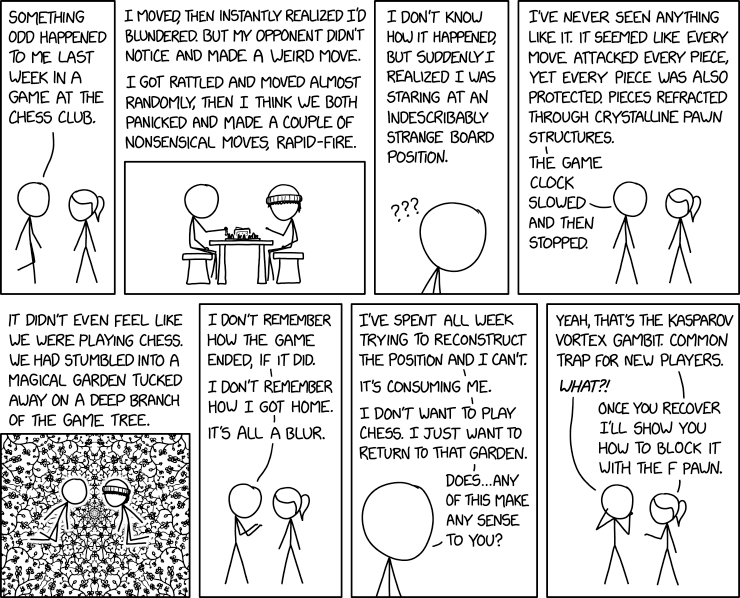#3082: Chess Position
Permalink
Transcript
[In the first panel, Cueball is walking in from the left, while talking to Ponytail.]
Cueball: Something odd happened to me last week in a game at the chess club.
[Cueball is playing a game of chess against Knit Cap.]
[Caption above frame:]
I moved, then instantly realized I'd blundered. But my opponent didn't notice and made a weird move.
I got rattled and moved almost randomly, then I think we both panicked and made a couple of nonsensical moves, rapid-fire.
[Zoomed in on Cueball, with three question marks above his head]
I don't know how it happened, but suddenly I realized I was staring at an indescribably strange board position.
[Cueball is talking to Ponytail.]
Cueball: I've never seen anything like it. It seemed like every move attacked every piece, yet every piece was also protected. Pieces refracted through crystalline pawn structures.
Cueball: The game clock slowed and then stopped.
[Cueball and Knit Cap are floating in a complex five-fold symmetrical plant-like pattern of "game tree branches".]
[Caption above the frame]
It didn't even feel like we were playing chess. We had stumbled into a magical garden tucked away on a deep branch of the game tree.
[Cueball is talking to Ponytail.]
Cueball: I don't remember how the game ended, if it did.
Cueball: I don't remember how I got home.
Cueball: It's all a blur.
[Close-up of Cueball's head.]
Cueball: I've spent all week trying to reconstruct the position and can't.
Cueball: It's consuming me.
Cueball: I don't want to play chess. I just want to return to that garden.
Cueball: Does... any of this make sense to you?
[Cueball is standing with hands on face surprised as Ponytail talks with him.]
Ponytail: Yeah, that's the Kasparov Vortex Gambit. Common trap for new players.
Cueball: What?!
Ponytail: Once you recover I'll show you how to block it with the f pawn.
(Sourced from explainxkcd.com)
Title text:It's important to learn the moves that take you into the vortex, but it's best not to study vortex itself too closely. Even grandmasters who have built up a tolerance lose the ability to play for a few hours after studying it.